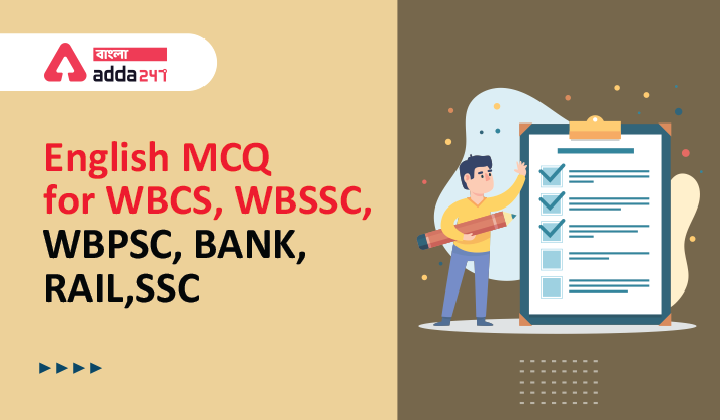Table of Contents
English Grammar MCQ : English Grammar MCQ is very important for WBTET, WBCS, SSC, CGL, Rail, Bank etc exam. You get here daily English Grammar MCQ . Everyday you get 10 English Grammar MCQ & Solution. It is necessary for upcoming all exam.
English Grammar MCQ
Directions (1-10): In the following questions, a sentence has been given in Direct/Indirect speech. Out of the four alternatives suggested, select the one which best expresses the same sentence in Indirect/Direct speech.
Q1. He said to me, “Where did my son go yesterday?’’
(a) He asked where my son went the day before.
(b) He asked where my son went the previous day.
(c) He asked where my son had gone the day before.
(d) He inquired where my son went the day before.
Q2. The actress said, ‘I do yoga every day.’
(a) The actress said that she does yoga every day.
(b) The actress said that she did yoga every day.
(c) The actress urged that she should do yoga every day.
(d) The actress said that she is doing yoga every day.
Q3. “Does this hotel have a swimming pool?’’ the guests inquired.
(a) The guests inquired if the hotel has a swimming pool.
(b) The guests inquire whether the hotel has a swimming pool.
(c) The guests inquired whether the hotel has a swimming pool.
(d) The guests inquired whether the hotel had a swimming pool.
Q4. Roshan said, ‘These books are mine.’
Check More: SSC GD Result 2022 Released, Check Tier 1 Result @ssc.nic.in
(a) Roshan said that these books are mine.
(b) Roshan said that those books were mine.
(c) Roshan informed me that those books must be mine.
(d) Roshan says that these books are mine.
Q5. She said, “When I was a child, I was afraid of ghosts.”
(a) She said that when she was a child, she was afraid of ghosts.
(b) She says that when as a child, she could get afraid of ghosts.
(c) She said that when she was a child, she was afraid of ghosts.
(d) She said that when she was a child, she might be afraid of ghosts.
Q6. Her father said, “You should take care of yourself first.’’
(a) Her father advised her to take care of herself first.
(b) Her father asked that she must take care of herself first.
(c) Her father ordered her to take care of herself first.
(d) Her father told her that one must take care of oneself first.
Q7. “Please do not bring food into the park,” said a park keeper.
(a) A park keeper argued that not to bring food into the park.
(b) A park keeper demanded that one should not bring food into the park.
(c) A park keeper said not to bring food into the park.
(d) A park keeper asked not to bring food into the park.
Q8. Anika said, ‘I have finished my homework.’
(a) Anika said that she has finished her work.
(b) Anika said that she had finished her work.
(c) Anika says that she finishes her work.
(d) Anika informed that she finished her work.
Q9. “Please maintain silence,” the receptionist told us.
(a) The receptionist told us to maintain silence.
(b) The receptionist said that silence must be maintained.
(c) The receptionist informed us that we can maintain silence.
(d) The receptionist asked us if we could maintain silence.
Q10.Nishu told me that it had been raining for three hours.
(a) Nishu said to me, “It had been raining for three hours.”
(b) Nishu said to me, “It would be raining for three hours.”
(c) Nishu said to me, “It was raining for three hours.”
(d) Nishu said to me, “It has been raining for three hours
Check Also: Calcutta High Court Recruitment 2022, Apply for 17 Posts
English Grammar Solution
S1. Ans (c)
Sol. The correct answer is option c.
The given sentence is ‘Direct Speech’.
Direct Speech – Reporting the message of the speaker in the exact words as spoken by
him.
The given sentence is an ‘Interrogative Sentence.’
Sentences that ask questions are called interrogative sentences. Every interrogative sentence ends with a question mark. There are two main kinds of interrogative sentences. Those which start with an auxiliary verb and those which start with a question word such as what, why, when, where, how etc.
While changing it into an indirect form, we consider following rules.
Reported Verb – ‘Asked’ remains unchanged.
Conjunction – In the Interrogative sentence, conjunction ‘Whether/If’ is used.
‘Yesterday’ changes to ‘The day before / the previous day.’
The sentence thus formed is – He asked where my son had gone the day before.
S2. Ans (a)
Sol. The correct answer is option a.
The given sentence is ‘Direct Speech’.
Direct Speech – Reporting the message of the speaker in the exact words as spoken by
him.
The given sentence is an ‘Assertive Sentence.’
Sentences that make a statement are called assertive sentences. These sentences may be positive, negative, false, or true statements.
While changing it into an indirect form, we consider following rules.
Reported Verb – ‘Said’ remains unchanged.
Conjunction – In the Assertive sentence conjunction ‘That’ is used.
If the verb in the reported speech is stating a universal truth, a habit, a constant situation, the tense of that verb does not change.
The sentence thus formed is – The actress said that she does yoga every day.
S3. Ans (d)
Sol. The correct answer is option d.
The given sentence is ‘Direct Speech’.
Direct Speech – Reporting the message of the speaker in the exact words as spoken by
him.
The given sentence is an ‘Interrogative Sentence.’
Sentences that ask questions are called interrogative sentences. Every interrogative sentence ends with a question mark. There are two main kinds of interrogative sentences. Those which start with an auxiliary verb and those which start with a question word such as what, why, when, where, how etc.
While changing it into an indirect form, we consider following rules.
Reported Verb – ‘Inquired’ remains unchanged.
Conjunction – In the Interrogative sentence, conjunction ‘Whether/If’ is used.
The sentence thus formed is – The guests inquired whether the hotel had a swimming pool.
S4. Ans (b)
Sol. The correct answer is option b.
The given sentence is ‘Direct Speech’.
Direct Speech – Reporting the message of the speaker in the exact words as spoken by
him.
The given sentence is an ‘Assertive Sentence.’
Sentences that make a statement are called assertive sentences. These sentences may be positive, negative, false, or true statements.
While changing it into an indirect form, we consider following rules.
Reported Verb – ‘Said’ remains unchanged.
Conjunction – In the Assertive sentence conjunction ‘That’ is used.
‘These’ changes to ‘Those.’
The sentence thus formed is – Roshan said that those books were mine.
S5. Ans (c)
Sol. The correct answer is option c.
The given sentence is ‘Direct Speech’.
Direct Speech – Reporting the message of the speaker in the exact words as spoken by
him.
The given sentence is an ‘Assertive Sentence.’
Sentences that make a statement are called assertive sentences. These sentences may be positive, negative, false, or true statements.
While changing it into an indirect form, we consider following rules.
Reported Verb – ‘Said’ remains unchanged.
Conjunction – In the Assertive sentence conjunction ‘That’ is used.
The sentence thus formed is – She said that when she was a child, she was afraid of ghosts.
S6. Ans (a)
Sol. The correct answer is option a.
The given sentence is ‘Direct Speech’.
Direct Speech – Reporting the message of the speaker in the exact words as spoken by
him.
The given sentence is an ‘Imperative Sentence.’
Imperative Sentence – Imperative sentences give an order or direct command. These sentences may come in the form of advice, appeal, request, or order.
While changing it into an indirect form, we consider following rules.
Reported Verb – ‘Said’ changes to ‘Advised.’
Conjunction – In the Imperative sentence conjunction ‘To’ is used.
The sentence thus formed is – Her father advised her to take care of herself first.
S7. Ans (c)
Sol. The correct answer is option c.
The given sentence is ‘Direct Speech’.
Direct Speech – Reporting the message of the speaker in the exact words as spoken by
him.
The given sentence is an ‘Imperative Sentence.’
Imperative Sentence – Imperative sentences give an order or direct command. These sentences may come in the form of advice, appeal, request, or order.
While changing it into an indirect form, we consider following rules.
Reported Verb – ‘Said’ changes to ‘Advised.’
Conjunction – In the Imperative sentence conjunction ‘To’ is used.
The sentence thus formed is – A park keeper said not to bring food into the park.
S8. Ans (b)
Sol. The correct answer is option b.
The given sentence is ‘Direct Speech’.
Direct Speech – Reporting the message of the speaker in the exact words as spoken by
him.
The given sentence is an ‘Assertive Sentence.’
Sentences that make a statement are called assertive sentences. These sentences may be positive, negative, false, or true statements.
While changing it into an indirect form, we consider following rules.
Reported Verb – ‘Said’ remains unchanged.
Conjunction – In the Assertive sentence conjunction ‘That’ is used.
The sentence thus formed is – Anika said that she had finished her work.
S9. Ans (a)
Sol. The correct answer is option a.
The given sentence is ‘Direct Speech’.
Direct Speech – Reporting the message of the speaker in the exact words as spoken by
him.
The given sentence is an ‘Imperative Sentence.’
Imperative Sentence – Imperative sentences give an order or direct command. These sentences may come in the form of advice, appeal, request, or order.
While changing it into an indirect form, we consider following rules.
Reported Verb – ‘Told’ remains unchanged.
Conjunction – In the Imperative sentence conjunction ‘To’ is used.
The sentence thus formed is – The receptionist told us to maintain silence.
S10. Ans (d)
Sol. The correct answer is option d.
The given sentence is ‘Indirect Speech’.
Indirect Speech- Reporting the message of the speaker in your own words without any change in the meaning of the statement is called indirect speech.
The given sentence is an ‘Assertive Sentence.’
Sentences that make a statement are called assertive sentences. These sentences may be positive, negative, false, or true statements.
The sentence thus formed is – Nishu said to me, “It has been raining for three hours.”
Read More :
WBPSC Clerkship Preliminary Exam 2022 Previous Year Question Paper
Kolkata Police Recruitment 2022 Eligibility Criteria
West Bengal Co-Operative Service Commission Exam 2022 Postponed
WBCS 2021 Notification (WBCS 2021 বিজ্ঞপ্তি)
পশ্চিমবঙ্গ পুলিশ কনস্টেবল রেজাল্ট 2021
Kolkata Police Syllabus 2022 Download PDF Click here
English Grammar MCQ প্রতিদিন ADDA 247 বাংলা 10 টি করে English Grammar MCQ সহ Answers এবং Solution দিচ্ছে। WB TET,WBCS, WBP, WBSSC, BANK, RAIL সমস্ত প্রতিযোগিতামূলক পরীক্ষার জন্য English Grammar MCQ Solution অত্যন্ত গুরুত্বপূর্ণ। History, Geography, Physics, Chemistry, Biology, Economics, Polity এবং Daily Reasoning এর নতুন নতুন অনেক MCQ পরীক্ষার্থীদের সকল প্রতিযোগিতামূলক পরীক্ষায় সাফল্য আনতে সাহায্য করবে। প্রতিযোগিতামূলক উত্তীর্ণ হওয়ার চাবিকাঠি Mathematics এবং Reasoning। Daily Mathematics এবং Reasoning প্র্যাক্টিস যেকোনো পরীক্ষার্থীকে সাফল্যের দোরগোড়ায় পৌঁছে দেবে।
Adda247 ইউটিউব চ্যানেল – Adda247 Youtube Channel
Adda247 টেলিগ্রাম চ্যানেল – Adda247 Telegram Channel






